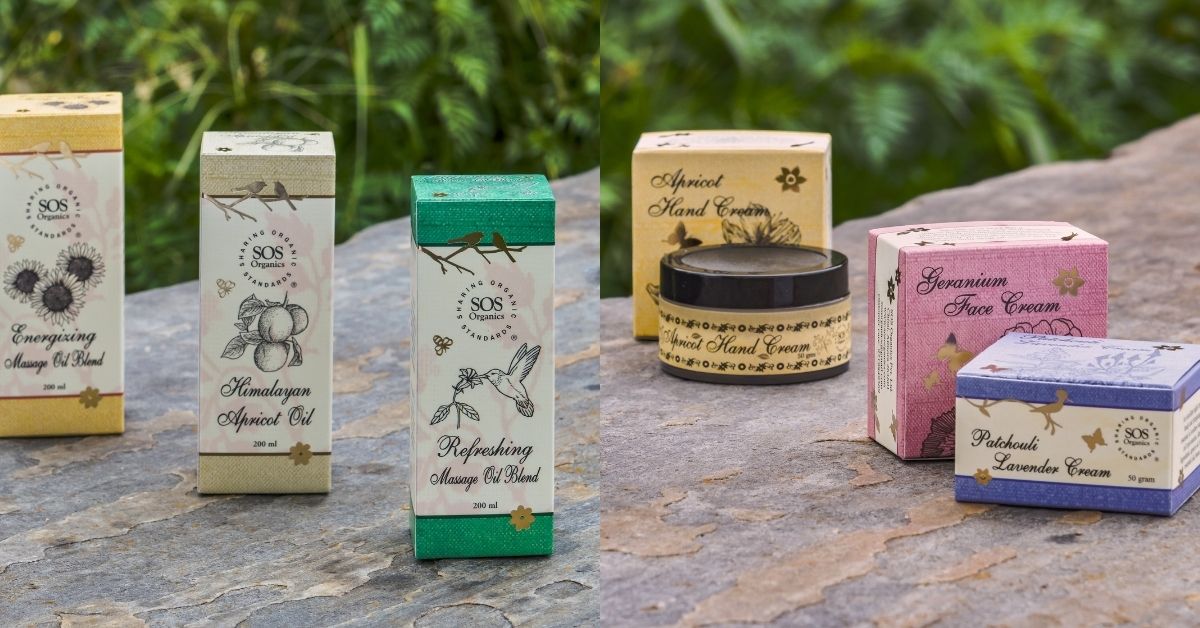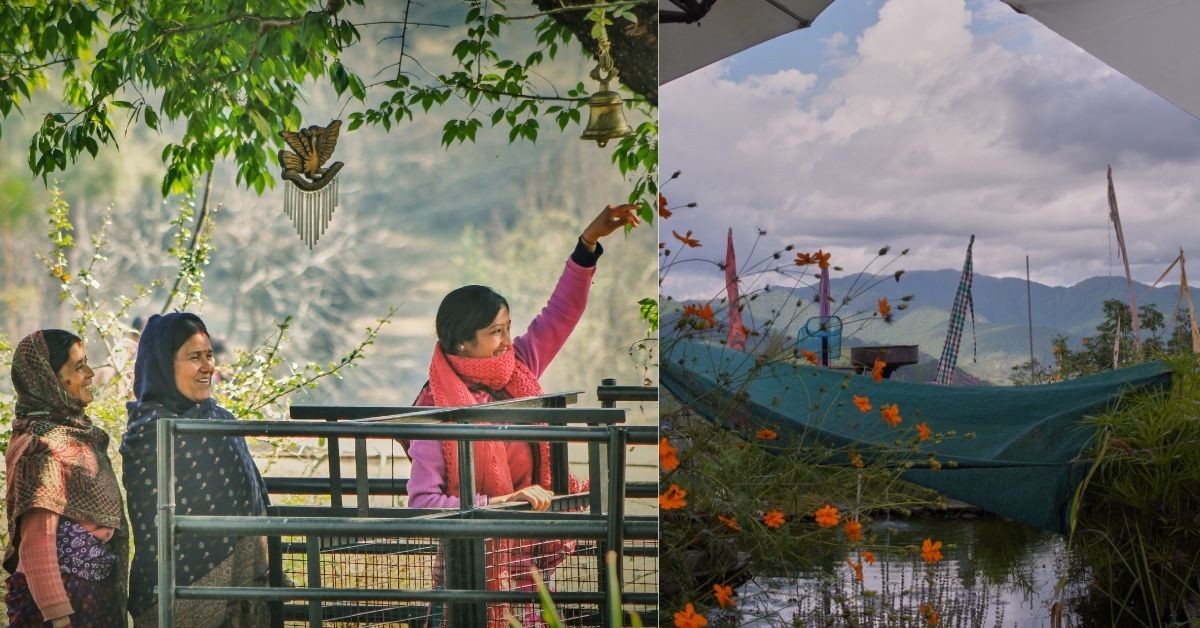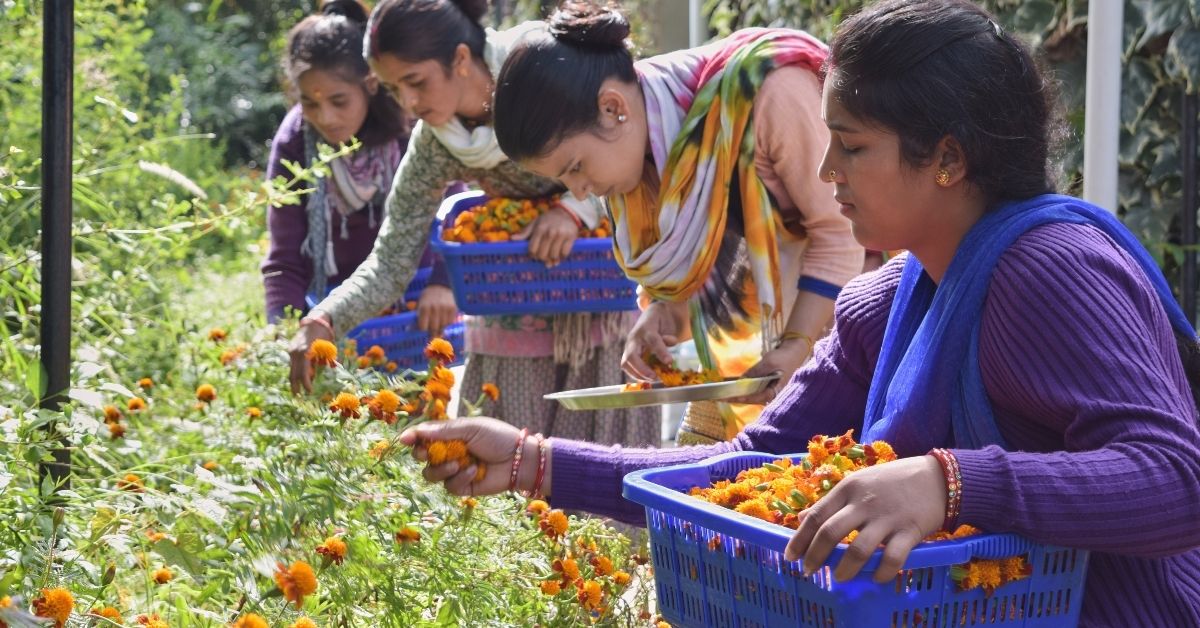To escape a hectic city life, full of woes and stress, and relocate to a quiet abode in the hills might very well be every urban dweller’s dream today. But how do you shift to an organic way of life in the hills without infringing upon the rights and agencies of the area’s original inhabitants?
Amrita Chengappa, who left behind her bustling city life in Lucknow in search of something simple, remains mindful of these questions. In 2002, she, along with her husband Santosh, moved to Chitai Pant village in Uttarakhand’s Almora district to lead a better life. “The idea was not to come to a village and turn it into an industrial area,” Amrita tells The Better India. “People come to the hills with many agendas and ideas in mind, but then they build a house on someone’s land, and the owner of the land ends up becoming a watchman for their home.” This, she says, was something that both her and Santosh wanted to avoid.
Together, the couple runs SOS Organics, launched in 2008, to integrate sustainable farming with producing a vast range of organic products, including candles, natural cosmetics, seasonings, honey, health foods, salt lamps and home care items.

‘Small is beautiful’
Amrita has always been interested in traditional knowledge including ayurveda, something she says is very prevalent in the southern region of the country, where she is from. The entire idea of SOS Organics was inspired by E F Schumacher’s Small Is Beautiful: A Study Of Economics As If People Really Mattered. “In the book, he talks about an economic system which is more decentralised and small, where people do work that they actually enjoy or can take something away from, besides only monetary benefits,” she explains.
“We wanted people to understand that you can make a viable project without actually taking from the Earth. Locals in the Kumaon region are generally only employed by the government or the army. Our idea was to do something women-centric. We were also clear that we wanted the project to be sustainable, economically or otherwise,” she adds.
It took Amrita and Santosh five years of travelling and acquainting themselves with the area before SOS organics took shape. “We did research and looked into the lives that locals were leading. Gandhi had talked about how villages should be making their own candles and other products, which I thought was a good idea to implement,” she says.

At SOS, the idea is to take as little from nature as possible. “The entire project runs only on rainwater harvesting. We don’t even have a Jal Nigam connection. We’re living in a rain shadow area that experiences a lot of water problems. Watching a local carry a 50-litre can of water so you can take a bath is an eye opening experience, and really made me think twice about my own water usage. So one of the first things we did was build water harvesting tanks, where around 2 lakh litres of water has been harvested. Around 70% of our power is solar-generated. We also aim to use whatever produce is already available here,” she says.
Going into further details about what exactly goes into SOS’s products, Amrita explains, “All the colours we use in our soaps are natural. We use the bichu buti, or stinging nettle, which gives a lovely green colour. We also use haldi, and neel patta (indigo). We use essential oils instead of fragrant oils, which have artificial smells. We make teas from tulsi, rhododendron, stinging nettle, and other herbs that are found here easily. We also use them to make Italian mixes where we take, say, junglee ajwain, to be incorporated. We wanted to use whatever was already growing here, and then look at value addition.”
“We have access to junglee apricot kernels, which we use to make cold pressed oils using our kachi ghani. The skin that’s left is powdered, dried and made into other products. So we avoid as much wastage as we can, and leave behind small footprints. You actually need very little to create a livelihood,” she says.

Their candles are priced at around Rs 160, cold-pressed honey at around Rs 220, and seasonings at around Rs 140.
While COVID-19 slightly impacted their earnings last year, SOS Organics was able to generate a turnover of around Rs 1.2 crore. They receive around 25-30 orders per week. “One of the best things has been repeat customers who contribute to around 60% of our total orders,” Amrita notes.
‘Prepare yourself for what’s to come’
“Because we don’t use chemicals, the shelf-life of our products is around one year. So we can’t really get into a massive distribution model and produce a million pieces. In any case, that’s not our vision. We’re different from a big brand that just calls themselves ‘organic’,” she says.
She adds that they’ve never had a budget for marketing, and most of their popularity has spread through word-of-mouth. Most of their funding has been private. It took them around five years to break even.
To make the products, SOS has employed a small team of local women who make everything by hand. “They all live about a 5-minute walk from where they work, and do so in two shifts. They come in at 9.30 am and leave at around 1 pm. Then they come back at 2 and leave at 5,” Amrita says. The women leave before it gets dark, as they have to carry wood and water back home. In addition, the area is often frequented by leopards, so maintaining the women’s safety is a priority for SOS, she adds.
They have a separate self-help group of women that only sort their grains. Around 7 women have been employed to make the products. They’re interchangeable with their skills, Amrita says, so while she comes up with the smells and combinations, it’s the ladies who see the final product through. The village is plagued with a massive problem of alcoholism, she adds, so she ensures the money goes directly to the women’s bank accounts, instead of the hands of other family members who might misuse these earnings.

Coming to what challenges she faced in starting and running the business, she says, “People were a little suspicious when we first came here, possibly because they’ve seen their lands being exploited by urban dwellers. We were met with a bit of resistance from locals, which dissipated when they understood our intentions better. When we first came here, we also found that people were not aware of or well-connected to their roots. For example, to them, ragi used to be gareeb ka khana [food of the poor]. They were also apprehensive about anything that was ‘traditional’. We had to convince them that there was a market for the produce found in their region.”
On what advice she would give to people hoping to make an all-round lifestyle change to a more sustainable way of life, Amrita notes, “Sustainable living starts with yourself. People have this misconception that they can go to the mountains and have the same lifestyle as they did in, say, Delhi. That’s not how it works. If you want to fly first class and drive a Beemer and then come to a village to start a project — those two things don’t go hand-in-hand. You also need to know that you can’t just go into this expecting an abundance of profits. So if you’re not mentally prepared, it can be quite taxing. People looking to shift to a more sustainable lifestyle need to be open and prepared to learn a lot. When we began, we did everything by ourselves, because we couldn’t afford to hire anyone. Designing our first label, setting up our first website, the first photographs we clicked — that was all us.”
Her transition from the city to a village in the middle of nowhere, Amrita says that there were challenges but adds, “I have access to fresh air, clean water, and an uncontaminated environment. So what more could I have asked for?”
For orders, or more information on the importance of sustainability and how to lead this lifestyle yourself, you can visit SOS Organic’s website.
Edited by Yoshita Rao
No comments:
Post a Comment